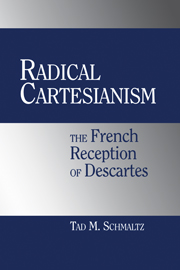Book contents
- Frontmatter
- Contents
- Preface
- A Note on Citation and Translation
- List of Abbreviations
- Introduction: Radical Cartesianism in Context
- Part I ROBERT DESGABETS
- 1 Desgabets's Considérations, Arnauld, and Cartesianism
- Part II THREE RADICAL DOCTRINES
- Part III PIERRE-SYLVAIN REGIS
- Conclusion: “A Forgotten Branch of Cartesianism”
- Works Cited
- Index
1 - Desgabets's Considérations, Arnauld, and Cartesianism
Published online by Cambridge University Press: 03 July 2009
- Frontmatter
- Contents
- Preface
- A Note on Citation and Translation
- List of Abbreviations
- Introduction: Radical Cartesianism in Context
- Part I ROBERT DESGABETS
- 1 Desgabets's Considérations, Arnauld, and Cartesianism
- Part II THREE RADICAL DOCTRINES
- Part III PIERRE-SYLVAIN REGIS
- Conclusion: “A Forgotten Branch of Cartesianism”
- Works Cited
- Index
Summary
The Descartes most familiar to twentieth-century philosophers is the Descartes of the first two Meditations, someone preoccupied with hyperbolic doubt of the material world and the certainty of knowledge of the self that emerges from the famous cogito argument. However, this Descartes, the paradigmatic egoistic epistemologist, contrasts markedly with the Descartes received in the first few decades following his death. That Descartes was concerned primarily with overturning the old scholastic philosophy of nature in a manner that has ramifications for the doctrine of the Eucharist. One thesis here is that the early modern emphasis on Cartesian eucharistic theology is reflected in the 1671 decree from Louis XIV that triggered the state-sponsored campaign against Cartesianism in France.
The theological importance of the doctrine of the Eucharist is clear from its central role in the Reformation and Counter-Reformation. In France, moreover, the political ramifications of the doctrine are revealed by the religious wars between Catholics and (Calvinist) Huguenots that resulted in the uneasy truce declared in the Edict of Nantes (1598). However, the Cartesian episode in the history of the controversy over the Eucharist highlights important philosophical aspects of this doctrine. The official Catholic teaching on the sacrament draws on the ontologically loaded notions of persisting “species” and “transubstaniated” substances. Just as such notions had earlier forced the scholastics to modify Aristotelian categories that were not originally constructed to accommodate them, so Descartes and his Catholic followers felt the need to make room for these notions within the confines of Cartesian ontology.
- Type
- Chapter
- Information
- Radical CartesianismThe French Reception of Descartes, pp. 27 - 74Publisher: Cambridge University PressPrint publication year: 2002



